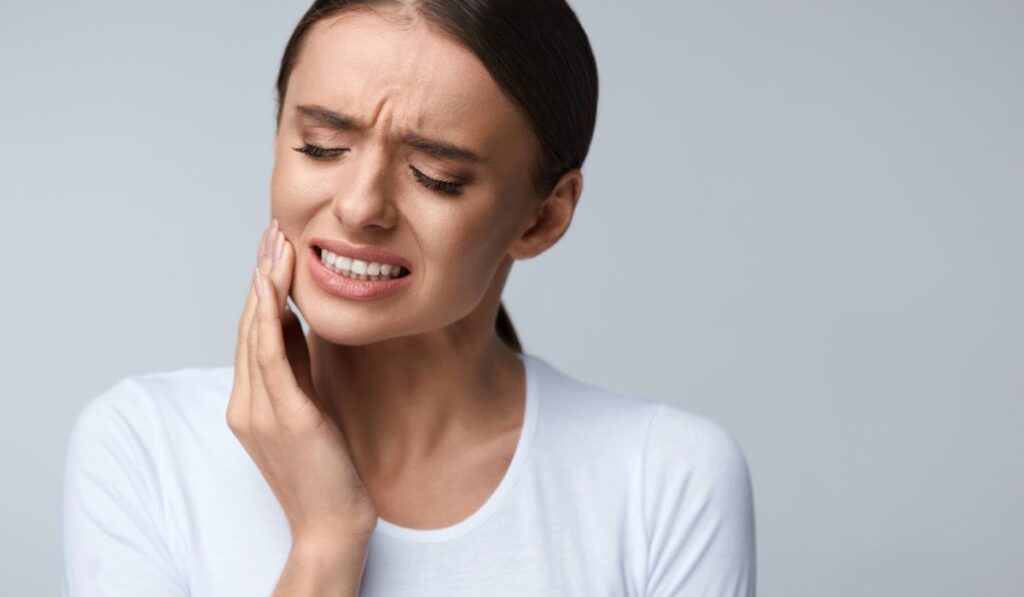We’ve all felt itchiness from bug bites or irritation. But have your teeth ever felt itchy? It’s a pretty strange feeling that may be a warning sign of some serious oral health issues — or a minor issue that you can address with some changes to your oral care routine. So, why do your teeth itch?
Itchy teeth can be caused by plaque buildup, gum disease, allergies, tooth damage, or even dental procedures. You can treat itchy teeth and gums at home by practicing good oral hygiene, sucking on ice cubes, or swishing salt water. Consult your dentist if your symptoms persist for more than a week.
Don’t panic just yet if your teeth and gums are itchy or irritated. These unpleasant symptoms might not be caused by serious health complications and can often be treated easily at home. Here’s everything you need to know about the possible causes and solutions for itchy teeth.
Why Do My Teeth Feel Itchy?

There are several reasons why your teeth might feel itchy. Fungal pathogens, plaque buildup, or even gum disease can cause itchy teeth.
Here are a few of the most common causes of itchy teeth:
Plaque Buildup
Excess plaque buildup can cause itchy teeth as well as other dental complications. Plaque is a sticky film made up of bacteria, germs, and sugars that sits on top of your teeth and gums.
Plaque can also cause cavities, gum disease, dental decay, and more. Brushing and flossing twice a day are the best ways to prevent and reduce plaque buildup.
Gum Disease
Periodontal disease, otherwise known as gum disease, can cause itchy teeth. Gum disease is caused by poor oral hygiene, excess plaque, and tartar buildup. Symptoms of periodontal disease can also include swollen or bleeding gums, sensitivity, tooth loss, and more.
Allergies
Allergies are another common culprit behind itchy teeth. Certain allergies can cause your throat, gums, and the roof of your mouth to start to itch or swell. These allergies can also affect your teeth, causing them to feel itchy or irritated.
Teeth Grinding
Teeth grinding or jaw clenching might be another reason for itchy teeth. Such actions can wear down the enamel and lead to increased sensitivity. However, there isn’t any solid evidence backing these claims.
Infections
Bacteria, viruses, fungal pathogens, or parasitic pathogens might also cause itchy and irritated teeth. For instance, the varicella-zoster virus can cause shingles as well as odontalgia, which is pain and itchiness in the teeth.
Tooth Damage
You might feel itchiness, pain, or sensitivity when a tooth’s structure, nerves, root, or pulp become damaged. Tooth damage can happen during everyday activities like exercising, cooking, or even driving.
A Recent Dental Procedure
Dental procedures like a root canal, cavity filling, or extraction can lead to unpleasant symptoms. These recent dental procedures might cause your teeth to feel itchy, irritated, sensitive, or painful. However, these unpleasant symptoms are typically part of the healing process and completely natural.
How to Treat Itchy Teeth in 7 Easy Ways

Don’t get too concerned just yet if your teeth are itchy or irritated. Thankfully, there are multiple straightforward ways you can try to treat itchy teeth.
Suck on Ice Cubes
Sucking on frozen water, frozen popsicles, or anything cold can help reduce symptoms of itchy teeth by decreasing gum inflammation. You can also consider sucking on frozen fruit such as grapes or strawberries to mix things up.
Use a Salt Water Rinse
You can also try swishing a homemade salt water rinse to reduce or eliminate unpleasant symptoms from itchy teeth and gums. Saltwater rinses can help kill harmful bacteria, reduce plaque, and aid in the healing process after a dental procedure.
To make a saltwater rinse at home, dissolve a tablespoon of salt into a cup of warm water. Swish the solution in your mouth for up to thirty seconds and rinse thoroughly with normal water afterward. Be sure to avoid swallowing the solution.
Stopping Smoking or Using Tobacco Products
Smoking, vaping, or chewing tobacco products can irritate the gums, leading to dry mouth, itchy teeth, and other harmful consequences. You can reduce or remove these negative symptoms entirely by quitting these habits.
Avoid Certain Foods
In some cases, food allergies can cause your teeth to feel itchy or irritated. Avoiding certain substances that irritate your oral health can help reduce these symptoms. Consult your doctor if you aren’t sure which foods are causing the issues. Your doctor might place you on an elimination diet, conduct tests, or order blood work to determine your allergies.
Inspect the Ingredients in Toothpaste or Mouthwash
In some cases, ingredients found in your toothpaste or mouthwash can lead to irritation, sensitivity, or even itchy teeth. You might have a minor allergy to certain ingredients or have increased sensitivity. The most common toothpaste ingredient that people are sensitive to is sodium lauryl sulfate (SLS).
Be sure to inspect all the ingredients in your oral hygiene products and consult your doctor to determine what’s best for you.
Try Taking Antihistamines
Antihistamines such as Benadryl (on Amazon) can help fight unpleasant symptoms from allergies, including itchy teeth. Antihistamines block chemical compounds created from your immune system that are responsible for symptoms of itching, vomiting, or other responses to allergens. Be sure to consult your doctor before taking any new medications.
Be Sure to Brush and Floss
Plaque development is one of the main culprits behind itchy teeth and gums. That’s why it’s crucial to brush and floss thoroughly at least twice a day. Practicing better oral hygiene can help decrease or remove itchiness, irritation, or other unpleasant symptoms.
How to Prevent Your Teeth From Itching
The best way to prevent itchy teeth is by practicing good oral hygiene techniques. Brushing and flossing thoroughly at least twice a day is essential to maintaining good oral health.
Be sure to brush for at least two minutes with fluoride toothpaste (on Amazon). Make sure you’re using a soft-bristle toothbrush (on Amazon) to avoid any damage to your enamel. You can also consider incorporating mouthwash to help fight symptoms of gum disease or infection.
If you’re a smoker, consider reducing or quitting tobacco products. These products can negatively impact oral health leading to itchy teeth, gum disease, or other serious health complications. Speak with your doctor or dentist to determine the best steps for your situation.
When Should You See Your Doctor?
In some cases, itchy gums and teeth can be an early warning sign of serious health complications such as periodontal disease. New medications, allergies, and hormonal changes can also cause itchy symptoms. For those reasons, treating itchy teeth and gums can be somewhat tricky.
You should consult your dentist if you’ve tried some home remedies and your symptoms are lasting more than a few days and over a week. Be sure to also contact your dentist if your symptoms get worse or you notice irritation, swelling, fever, or bleeding gums.
Always remember that symptoms shouldn’t be overlooked regardless of how big or small they might seem. You and your dentist can work together to determine the cause of the issue and develop a treatment plan that works for your situation.


